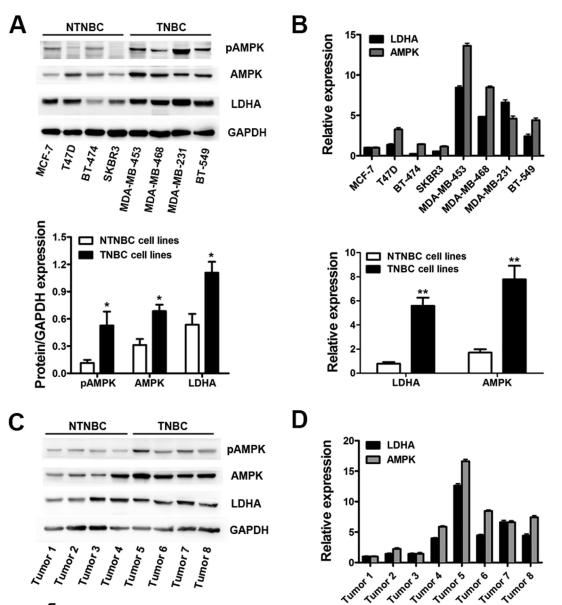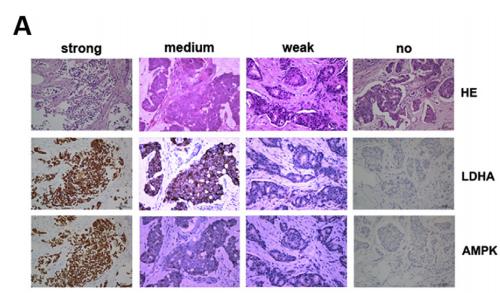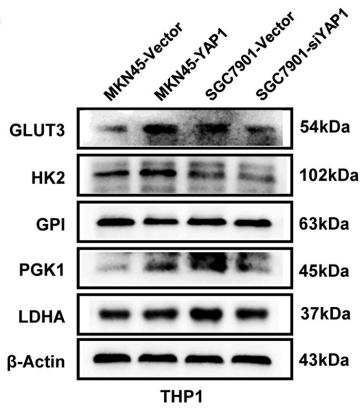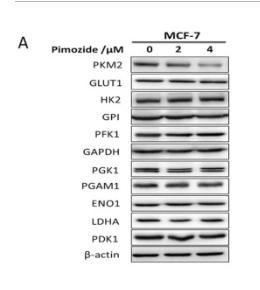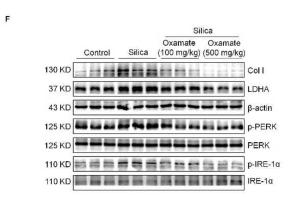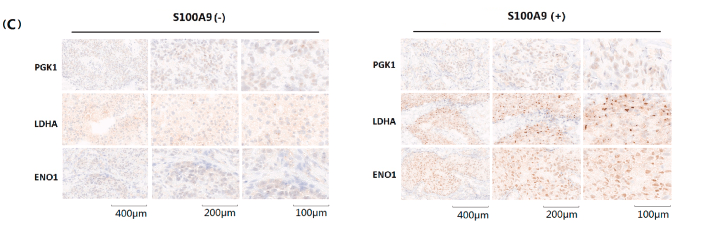LDHA Antibody - #DF6280
| Product: | LDHA Antibody |
| Catalog: | DF6280 |
| Description: | Rabbit polyclonal antibody to LDHA |
| Application: | WB IHC IF/ICC |
| Cited expt.: | WB, IHC |
| Reactivity: | Human, Mouse, Rat |
| Prediction: | Pig, Bovine, Sheep, Rabbit, Dog |
| Mol.Wt.: | 37kDa; 37kD(Calculated). |
| Uniprot: | P00338 |
| RRID: | AB_2838246 |
Related Downloads
Protocols
Product Info
*The optimal dilutions should be determined by the end user. For optimal experimental results, antibody reuse is not recommended.
*Tips:
WB: For western blot detection of denatured protein samples. IHC: For immunohistochemical detection of paraffin sections (IHC-p) or frozen sections (IHC-f) of tissue samples. IF/ICC: For immunofluorescence detection of cell samples. ELISA(peptide): For ELISA detection of antigenic peptide.
Cite Format: Affinity Biosciences Cat# DF6280, RRID:AB_2838246.
Fold/Unfold
Cell proliferation-inducing gene 19 protein; L lactate dehydrogenase A chain; Lactate dehydrogenase A; LDH A; LDH M; LDH muscle subunit; LDH1; LDH5; LDHA; PIG 19; PIG19; Renal carcinoma antigen NY-REN-59;
Immunogens
A synthesized peptide derived from human LDHA, corresponding to a region within C-terminal amino acids.
- P00338 LDHA_HUMAN:
- Protein BLAST With
- NCBI/
- ExPASy/
- Uniprot
MATLKDQLIYNLLKEEQTPQNKITVVGVGAVGMACAISILMKDLADELALVDVIEDKLKGEMMDLQHGSLFLRTPKIVSGKDYNVTANSKLVIITAGARQQEGESRLNLVQRNVNIFKFIIPNVVKYSPNCKLLIVSNPVDILTYVAWKISGFPKNRVIGSGCNLDSARFRYLMGERLGVHPLSCHGWVLGEHGDSSVPVWSGMNVAGVSLKTLHPDLGTDKDKEQWKEVHKQVVESAYEVIKLKGYTSWAIGLSVADLAESIMKNLRRVHPVSTMIKGLYGIKDDVFLSVPCILGQNGISDLVKVTLTSEEEARLKKSADTLWGIQKELQF
Predictions
Score>80(red) has high confidence and is suggested to be used for WB detection. *The prediction model is mainly based on the alignment of immunogen sequences, the results are for reference only, not as the basis of quality assurance.
High(score>80) Medium(80>score>50) Low(score<50) No confidence
Research Backgrounds
ISGylated.
Cytoplasm.
Belongs to the LDH/MDH superfamily. LDH family.
Research Fields
· Environmental Information Processing > Signal transduction > HIF-1 signaling pathway. (View pathway)
· Human Diseases > Cancers: Overview > Central carbon metabolism in cancer. (View pathway)
· Metabolism > Carbohydrate metabolism > Glycolysis / Gluconeogenesis.
· Metabolism > Amino acid metabolism > Cysteine and methionine metabolism.
· Metabolism > Carbohydrate metabolism > Pyruvate metabolism.
· Metabolism > Carbohydrate metabolism > Propanoate metabolism.
· Metabolism > Global and overview maps > Metabolic pathways.
· Organismal Systems > Endocrine system > Glucagon signaling pathway.
References
Application: WB Species: human Sample: MIA PaCa-2 cells
Application: WB Species: Human Sample: MCF-7 cells
Application: WB Species: human Sample:
Application: IHC Species: human Sample:
Application: WB Species: Mice Sample: lung tissues
Application: WB Species: Mouse Sample:
Restrictive clause
Affinity Biosciences tests all products strictly. Citations are provided as a resource for additional applications that have not been validated by Affinity Biosciences. Please choose the appropriate format for each application and consult Materials and Methods sections for additional details about the use of any product in these publications.
For Research Use Only.
Not for use in diagnostic or therapeutic procedures. Not for resale. Not for distribution without written consent. Affinity Biosciences will not be held responsible for patent infringement or other violations that may occur with the use of our products. Affinity Biosciences, Affinity Biosciences Logo and all other trademarks are the property of Affinity Biosciences LTD.







